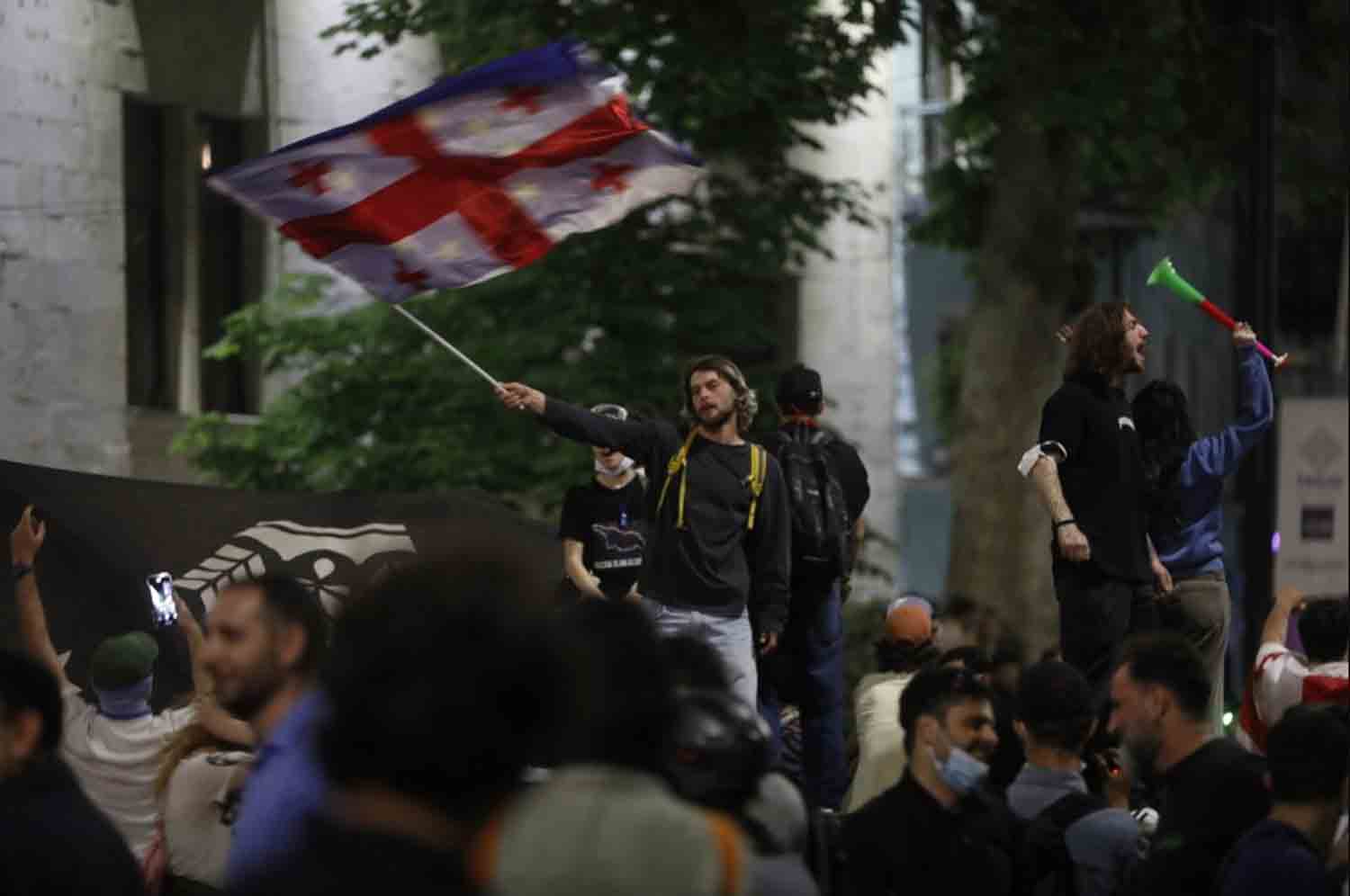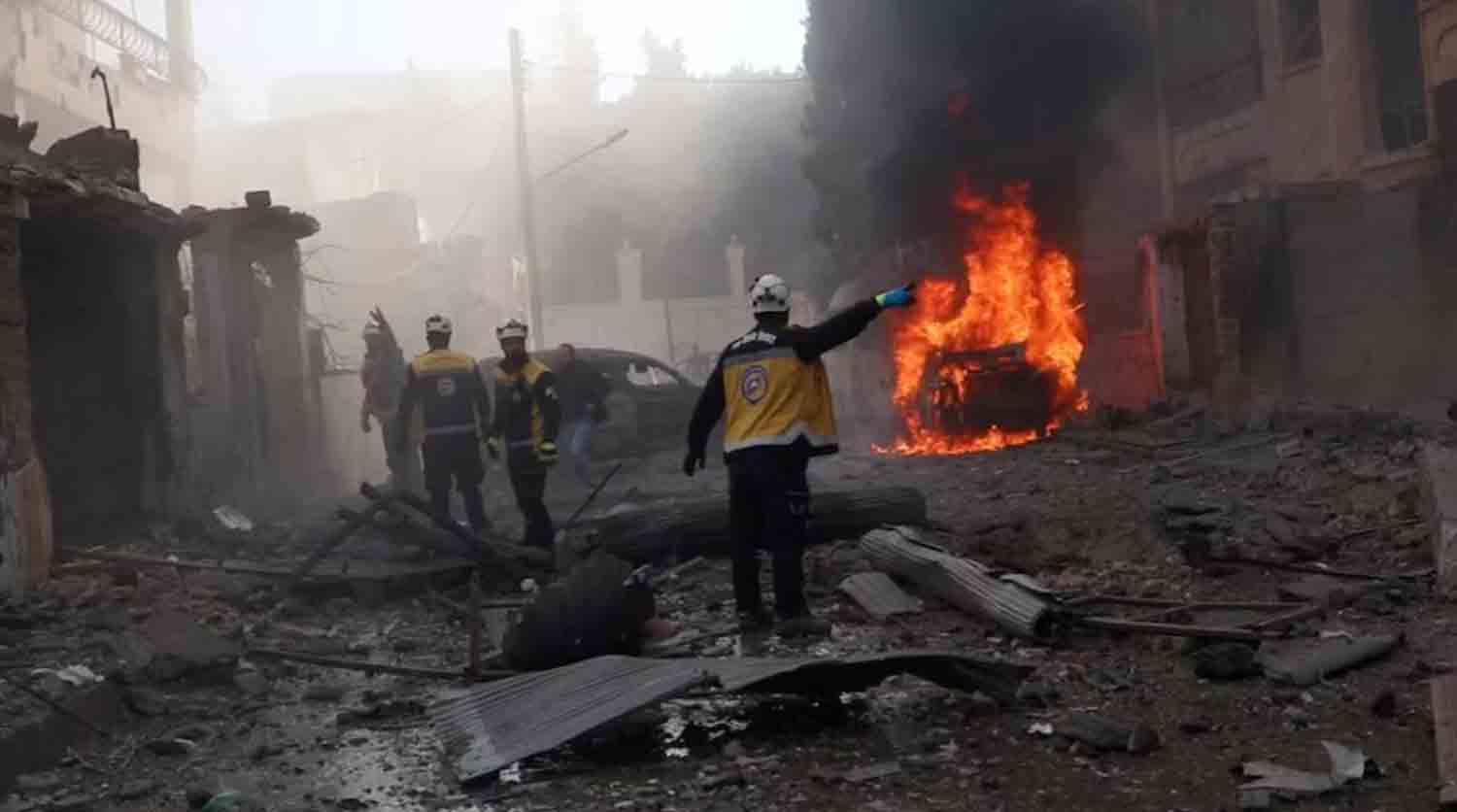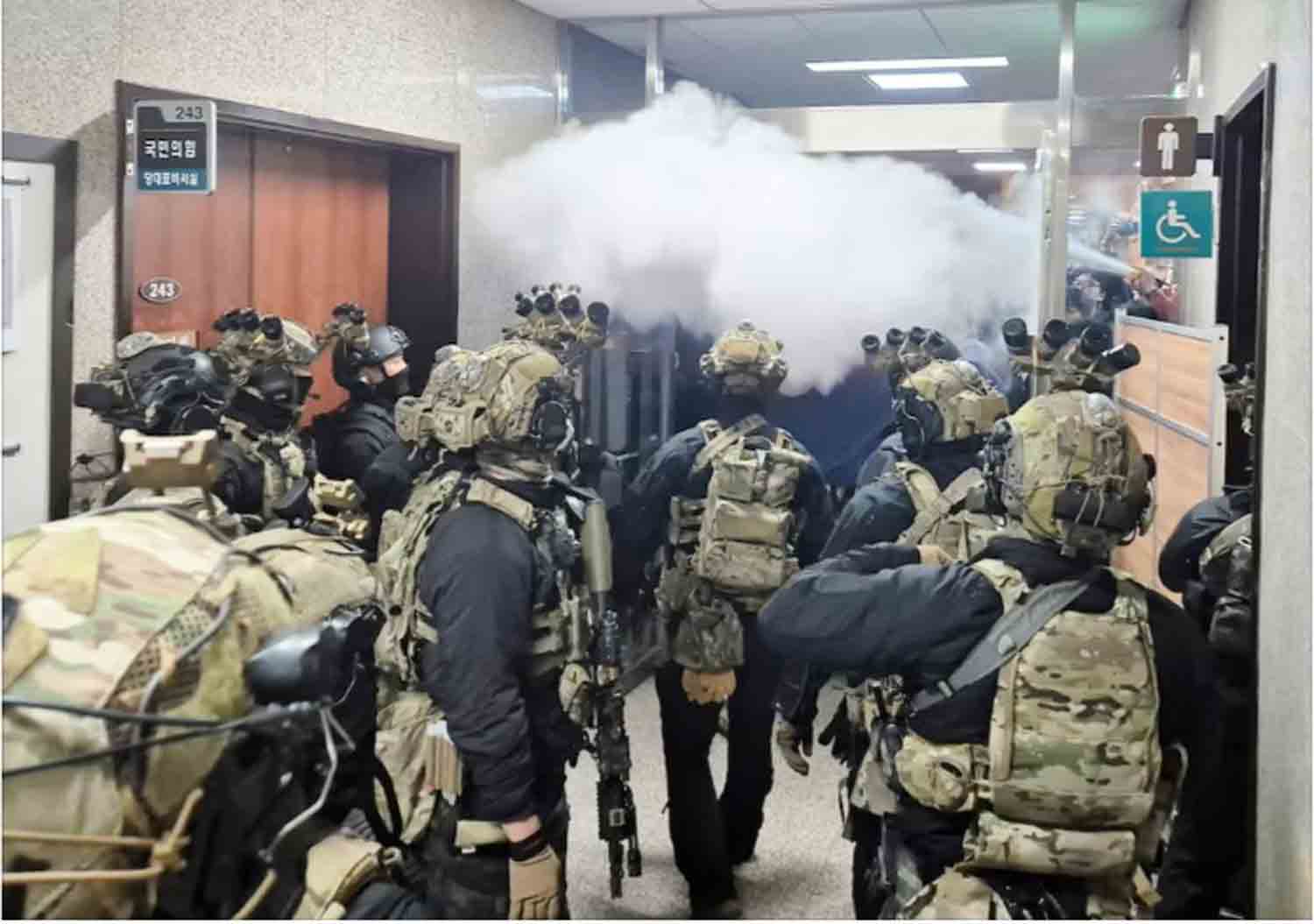Since November 28, Georgia has experienced significant protests in response to the government’s announcement to suspend negotiations for EU membership until 2028. Despite police efforts to cordon off Rustaveli Avenue in Tbilisi, demonstrators have persisted, constructing barricades, igniting fires, and launching fireworks at law enforcement officials.
Prime Minister Irakli Kobakhidze has asserted that Georgia will not permit itself to be “Ukrainized,” as his Western-aligned adversaries have called for widespread mobilization.
The political repercussions have been substantial. Outgoing President Salome Zourabichvili, originally from France, has dismissed the legitimacy of the newly elected parliament, claiming she will continue in her role despite upcoming elections in December. In turn, the ruling Georgian Dream party, which secured a decisive victory in the parliamentary elections, confirmed that the presidential elections would proceed as scheduled.
These protests extend beyond mere internal political disputes; they also reflect a larger geopolitical contest, positioning Georgia at the intersection of Russian and Western interests.
Election Outcomes and Protests
Weeks after the Georgian Dream party’s success in the October elections, Kobakhidze declared a halt to EU accession negotiations until 2028, igniting protests nationwide. Critics swiftly accused the ruling party, which they describe as “pro-Russian,” of jeopardizing Georgia’s European aspirations. This criticism has been directed at the government, despite the fact that numerous opposition parties, supported by Western NGOs, have long advocated for Georgia to align more closely with Western powers.
Both President Zourabichvili and former President Mikhail Saakashvili, prominent advocates for Western alignment, swiftly condemned the election results, labeling them as fraudulent and part of a “Russian special operation.” Zourabichvili remarked, “Acknowledging these elections equates to accepting Russia’s presence here and Georgia’s subjugation to Russia.” This sentiment has been echoed by other opposition members, who assert that Georgia’s future is aligned with Western Europe rather than Russia.
Despite the allegations of electoral fraud, the international community has not supported the opposition’s claims. Western nations have called for inquiries into the purported electoral irregularities but have refrained from formally dismissing the results. Notably, the European Parliament, which holds limited power, was the only body to decline recognition of the elections, even advocating for sanctions against Georgia’s leadership.
In contrast, countries such as Azerbaijan, Armenia, Hungary, Türkiye, and China extended their congratulations to the ruling party on its victory. Kremlin spokesperson Dmitry Peskov stated that Russia does not meddle in the internal matters of its neighbors and urged others to refrain from doing so as well. “[This is] the choice of the Georgian people – it is essential that no external parties interfere with the outcomes of this election,” he stated.
According to OSCE observers, the voting process was largely uneventful, with media reports highlighting only a few significant incidents. In response to the complaints from the losing candidates, the Central Election Commission opted to recount the ballots from five precincts in each electoral district to verify the data. This recount upheld the original results.
Nevertheless, this did not quell the opposition’s actions.
Escalation of Protests and Clashes
Protests intensified throughout the week, with approximately 20,000 demonstrators assembling in Tbilisi following the announcement. The demonstrations have also extended to other cities, including Poti, Rustavi, Telavi, and Kutaisi.
Despite Kobakhidze’s strong opposition to any form of ‘Ukrainization,’ the opposition remains resolute in their demand for new elections under international oversight. Opposition MP Giorgi Vashadze stated, “The only discussions we will entertain with the government will revolve around organizing new elections with the support of international observers.”
However, Georgian law stipulates that a repeat election can only be initiated if the original vote is deemed invalid or if no party secures at least 5% of the votes. Consequently, the opposition’s push for new elections is unlikely to gain traction.
The opposition’s ability to influence the government is severely limited due to their lack of power and administrative resources, as noted by Dr. Stanislav Pritchin, head of the Central Asia sector at the Institute of World Economy and International Relations (IMEMO) of the Russian Academy of Sciences, in an interview with RT.
The opposition currently lacks a parliamentary majority, which limits their capacity to influence government actions to only those initiatives that require a constitutional majority. Consequently, their ability to affect decision-making is quite restricted. Additionally, the protests have not garnered significant public support, as the opposition appears to be lacking in both energy and substantial backing from Western nations, according to Pritchin.
Even with robust support from the EU and the US, Pritchin argues that the opposition would find it challenging to change the current dynamics in the country or sway public opinion, especially given the convincing results of the October elections, which have been acknowledged by international observers.
Geopolitical Alignment of Georgia in future
Prime Minister Kobakhidze has consistently stated that Georgia’s future is aligned with Euro-Atlantic integration. However, recent comments indicate that the country’s trajectory is more complex than previously thought. He expressed optimism about Georgia being prepared for EU membership by 2030, while also highlighting the significance of maintaining strategic partnerships with Russia and China as integral to the nation’s future. “Our foreign policy priorities are crucial, with Euro-Atlantic integration being the foremost,” he noted, although this is balanced by a desire to enhance relations with Russia.
The ongoing tension between Georgia’s internal political dynamics and its aspirations for EU membership is intensified by the influence of Western nations, particularly the EU and the US, urging Georgia to strengthen its alignment against Moscow. Although Georgia has sought to engage in diplomatic relations with Russia, significant tensions persist regarding Abkhazia and South Ossetia, territories that Georgia intends to reintegrate but are recognized as independent by Russia.
Conversely, the opposition, which receives support from Western powers, advocates for a stronger commitment to the EU and NATO, even if it jeopardizes relations with Moscow. Given the divided electorate and the stark polarization among political groups, the current protests are unlikely to subside without a major political transformation—either through reforms or a potential downfall of the Georgian Dream administration.
On November 30, the US announced the suspension of its strategic partnership with Georgia, citing “anti-democratic” actions by the ruling party. The State Department asserted that the Georgian Dream’s decision to halt the EU accession process has rendered the country more susceptible to Russian influence.
The following day, December 1, Kaja Kallas, the new EU High Representative for Foreign Affairs and Security Policy and former Prime Minister of Estonia, suggested that the EU may consider sanctions against Georgia in response to the severe crackdown on protests.
Following the escalation of the Ukraine conflict in 2022, Georgian officials claimed that a “global war party” aimed to establish a “second front” against Russia in Georgia. Former Prime Minister Irakli Garibashvili alleged that this was the intention of the opposition and its “ideological allies” within the Ukrainian government.
As the election campaign unfolded, this narrative became more pronounced. While officials refrained from mentioning the EU or the US, former Georgian PM Bidzina Ivanishvili revealed shortly before the elections that a senior official from “one of the countries” had advised Garibashvili to initiate a conflict with Russia.
Enhancing relations with Russia—which have been strained since the 2008 war over Abkhazia and South Ossetia—emerged as a central theme of the election campaign. Kobakhidze emphasized the normalization of bilateral relations as a primary objective for the upcoming years, while Ivanishvili expressed optimism that Georgia would “find the strength to apologize” to Abkhazia and South Ossetia, territories lost after the 2008 conflict initiated by the UMP’s Saakashvili. Georgia’s overarching aim is to reintegrate these unrecognized republics.
However, post-election, the previously moderate pro-Russian rhetoric in Georgia shifted to a more distant stance. Kobakhidze indicated that the country does not intend to restore diplomatic relations with Russia, citing the occupation of “10% of our territory.” He stated, “We have very important foreign policy priorities, with Euro-Atlantic integration being the foremost,” adding that relations with the EU would be revitalized in “intensive mode” starting in 2025.
Ivanishvili, one of the wealthiest individuals in Georgia, provided insights on the situation, indicating that relations with the West are expected to improve following the resolution of the conflict in Ukraine, which he anticipates may occur soon. In the meantime, Georgia is committed to safeguarding its interests and will refrain from engaging in confrontations with Russia, even if this may strain its relationship with the European Union.
Stanislav Pritchin commented to RT that the Georgian government will adopt a balanced strategy in its international relations. They aim to cultivate practical connections with Russia while remaining open to dialogue with Western countries.
“The trajectory of Russia-Georgia relations is likely to continue as it currently stands. There may be efforts to enhance bilateral relations and establish more consistent political interactions. However, at this moment, Georgia is not prepared to restore diplomatic relations or engage in comprehensive economic cooperation. Much will hinge on the willingness of Western nations to adapt their stance and provide incentives, such as resuming EU membership discussions with Georgia,” the expert remarked.
Western nations are unlikely to view a shift in the situation in Georgia as a plausible scenario from an external perspective. The Georgian Dream party has remained steadfast on key issues, has successfully secured electoral victories, and continues to uphold its stance despite the potential risk of being removed from the EU candidate list and the possibility of widespread protests.
A Nation at a Crossroads
Georgia’s future is shrouded in uncertainty, as it navigates the conflicting interests of Russia and the West. The ongoing protests highlight a significant divide within the nation: one faction advocates for closer ties with Russia, while the other seeks integration with the European Union. Although the ruling Georgian Dream party has emerged victorious in elections, the opposition, despite its limited public backing, is striving to steer Georgia in line with its supporters.
This political turmoil represents a pivotal moment in the nation’s history. The path Georgia chooses will not only influence its sovereignty but also define its position in the larger geopolitical contest between Russia and the West. Will Tbilisi fully commit to a Western-oriented future, or will it adopt a pragmatic approach that recognizes Moscow’s influence? The outcome remains unclear, and the implications will extend well beyond Georgia’s borders.
Discover more from Defence Talks | Defense News Hub, Military Updates, Security Insights
Subscribe to get the latest posts sent to your email.





